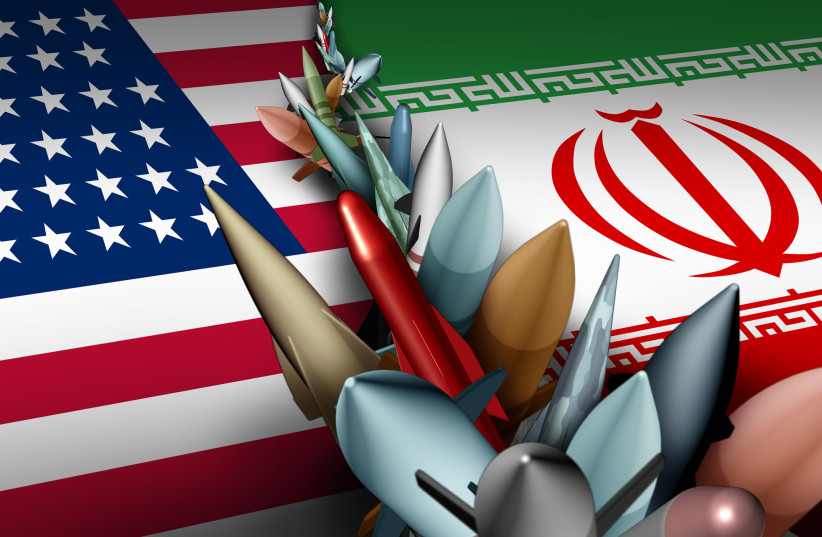Are nukes more critical than money or hostages in Iran deal? – analysis
There are more questions than answers presented by developments since Thursday between Iran and the West toward some kind of deal reducing tensions in the nuclear standoff.
The clearest details regard the process to release five Americans who the Islamic Republic has held hostage as well as the process to release billions of dollars of Iranian funds frozen in South Korea to Tehran.
Much of the heightened media attention surrounds the five Americans being transferred to house arrest and whether they will be freed entirely or how the frozen funds in South Korea are being unfrozen, how they will reach Qatari banks, and whether there are sufficient guarantees in place to prevent the funds being used for terrorism.
America will also keep a very close eye on whether the ayatollahs continue to prevent their proxies from attacking US troops in the Middle East. The EU will hope it can get them to stop actively helping Russia in its war with Ukraine.
What will happen with Iran’s nuclear enrichment program?
But the most critical aspect of the deal for Israel is what is happening regarding Iran’s nuclear enrichment program. Here, the story is dangerously unclear.
 An artistic illustration of Iran and the US negotiating over missiles, nuclear enrichment, and more. (credit: INGIMAGE)
An artistic illustration of Iran and the US negotiating over missiles, nuclear enrichment, and more. (credit: INGIMAGE)In August 2022, the deal being discussed involved Iran reducing its enriched uranium down to the levels required by the 2015 Iran nuclear deal, less than one third of the quantity for one nuclear weapon.
Back then, the big new concession from the West to the Islamic Republic was going to be letting it store its new advanced centrifuges, which were illegal under the 2015 deal. Yet, in terms of ready enriched uranium, Iran was going to move backward significantly.
By mid-June of this year, the deal had gotten worse from Israel’s perspective.
On the positive side, the West would be giving only partial sanctions relief.
But on the negative side, Tehran would not have to reduce its 60% highly enriched uranium or even its 20% medium enriched uranium. It would merely have to freeze enrichment at 60% levels.
There are reports that all Iran has done to date, or may do, is to slow down some of its 60% enrichment and to dilute some unspecified amount of existing uranium – possibly ensuring that its total quantity of 60% uranium stays the same.
Moreover, it is not clear that Iran has had to make any commitments regarding the nuclear issue as part of the latest partial sanctions relief deal, or whether everything is very temporary and voluntary, depending on whether a bigger deal gets struck in the coming month or so.
It appears that the West will take whatever it can get to reduce tensions. Mainly, the Biden administration does not want security problems from the Islamic Republic during the election year the US is about to enter.
If it can keep issues with Tehran below boiling, it will say it achieved a win or at least will be relieved that it does not need to face embarrassing or destabilizing new security situations.
But Israel is looking beyond the November 2024 US election to October 2025. At that point, many of Iran’s violations could be grandfathered in, as permitted under the JCPOA.
And if there were some gap, and one of its violations was somewhat beyond the October 2025 gift to the ayatollahs allowing them to have more centrifuges, the violation would not look as severe, because it would become a technical question about whether the violation were big enough to matter.
Jerusalem had hoped that at least even a bad deal with Tehran would push back their uranium enrichment stock, along with preventing any continued high or medium level enrichment.
For all practical purposes, if the deal does not push back Iran’s uranium stock – and worse for Israel – if it does not even freeze 60% enrichment, the West will have recognized Iran as a nuclear threshold state. This would reduce the Jewish state’s maneuvering options and narrow what diplomatic tools could be used to prevent Iran from breaking out a nuclear weapon, making the need for a military strike more likely.
Of course, the ayatollahs’ fear of such a strike may keep them from crossing the nuclear weapons redline, but Israel’s opportunity to use the Russia-Ukraine-Iran angle to pressure the Islamic Republic on the nuclear issue may be limited. The West will need to keep a more watchful eye than ever on any new suspicious nuclear moves by Iran.





Comments are closed.